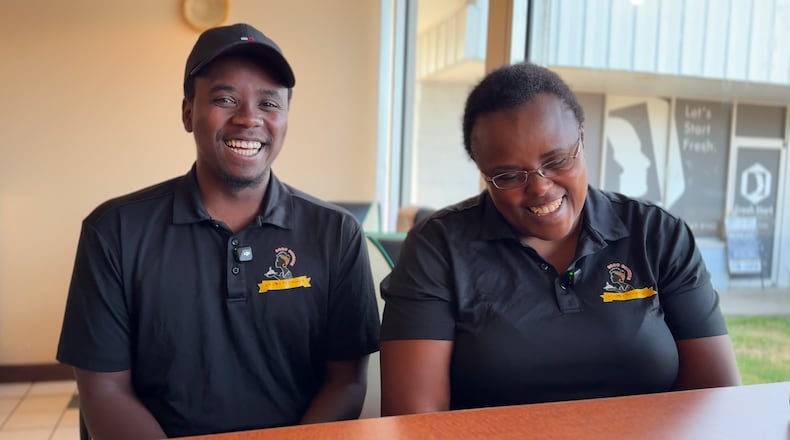But starting her own business — a little shop in a West Carrollton plaza on South Alex Road — felt like reaching a destination after a long, long journey.
“This is something that I did for my community, with my community,” Asingabona said.
Walking into the eatery, a curious customer may be greeted by the bright smile of Angelo Ihirwe, Asingabona’s son and sous chef.
African gospel music could be resonating from a large television set mounted to the wall as string lights running along the ceiling twinkle.
Photos of SoSo entrees and appetizers grace the wall next to the check-out counter, helping guide customers through the menu. Although many people coming into the shop are East African immigrants or their children looking for meals that remind them of another time, Asingabona and Ihirwe said they’re seeing native-born Daytonians also stop in.
“We get a lot of foodies, as people call them,” Ihirwe said. “Just people who go around trying new experiences, new restaurants. And they bring in a lot of foot traffic. It’s very helpful.”
Starting a business from the ground up is challenging from anyone, and Asingabona and Ihirwe had to learn everything themselves: finding a brick-and-mortar location, getting all necessary permits, and more. It took about a year to open the restaurant after obtaining a building.
But ever since SoSo’s opening, Ihirwe said his family has felt nothing but support from the community.
“The community continued to show up for us,” he said. “It’s a very humble, but a very sweet and joyful beginning.”
SoSo Cuisine’s menu is rooted in Rwandan and East African tradition. Asingabona was born in Rwanda but came to the United States from Zambia. Her family settled in Dayton 12 years ago, and Asingabona loved that her children had access to good schools and were welcomed.
“Dayton is very supporting, especially to the immigrant community,” Asingabona said with the help of her son translating on her behalf. Her native tongue is Kinyarwanda, but she also speaks English.
Fufu is one of the more popular menu items. The mound of dough is meant to be pinched off in chunks, kneaded and dipped into a companion dish like a hearty beef stew. Fried plantains and a fragrant, savory pilau rice make excellent companions to any of the SoSo staples.
Asingabona said sharing her culture through her restaurant is a joy. She wants Dayton-area residents to engage with the food of other nations and have good experiences doing so. West African restaurants are very popular, but she wants others to know more about the region where she grew up.
She herself has expanded her palate by trying things that are popular in the Dayton area.
But she said no one could have prepared her for the amount of cheese in typical American meals — dairy isn’t a common component of the East African diet.
And Ihirwe said he feels more connected to his mom through running a business together. She taught him how to cook all the dishes and he’s grown a real love for cooking, but also an added appreciation for his culture.
“That knowledge passed down from your elders, that’s not something a lot of people get chances to learn. It was a necessary process that I felt like I needed to go through,” he said.
About the Author

